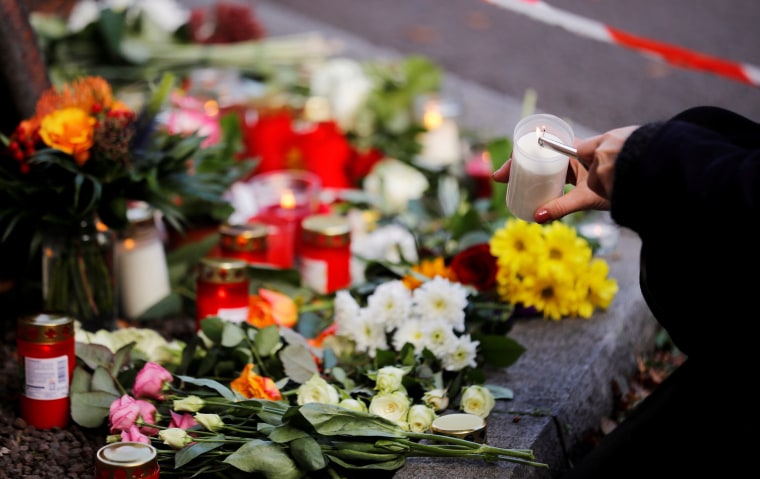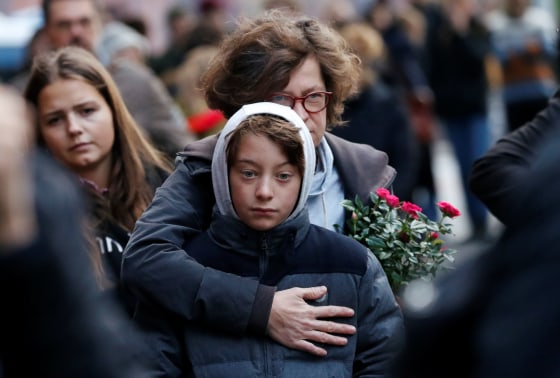MAINZ, Germany — For those gathered inside of a synagogue in the small, eastern German city of Halle, attending Wednesday's service on the Jewish holy day of Yom Kippur had been an energetic experience before spiraling into a scene of intense panic when a gunman tried to force his way inside.
Jeremy Borovitz, an American living in Berlin, had organized a trip to the synagogue for 20 visitors, including some Americans, when their worshipping was cut short when a security guard alerted worshippers. Suddenly, a loud boom reverberated in the synagogue and everyone was told to move away from the windows and the main worship area.
A lull in the commotion was followed by a series of "pops" from the sound of gunfire toward a wall of the synagogue where the shooter was trying to blast his way in, Borovitz recalled Thursday.
Those minutes "felt like an eternity" to Roman Remis, 31, who told NBC News he could see a gunman through the synagogue surveillance system and yelled at the congregation to barricade the doors. Worshippers dragged tables and chairs to block the entrance.
"I thought we were going to die," he said. "I only saw one police car from the camera. I believe that God saved us."
The assailant — later identified by prosecutors as German citizen Stephan B. — didn't breach the building, but two people were killed as part of his rampage and several more were injured. The attack, which was livestreamed on a popular gaming site, has shaken Germany and led to renewed calls for greater protection of the Jewish community.
"What we experienced yesterday was terror," federal prosecutor Peter Frank said during a news conference Thursday.
The suspect was at the synagogue for seven minutes, state interior minister Holger Stahlknecht told reporters. In addition to killing a man at a kebab shop, he also threw an explosive device.
The suspect later exchanged gunfire with a police officer and was injured at the neck before fleeing, Stahlknecht said. Just over 90 minutes after the first emergency call was made from the synagogue, the suspect was detained.
The suspect was characterized as a right-wing extremist, and Frank said he was attempting to copy similar attacks, including the deadly assault on a New Zealand mosque, while inspiring others.
"Residents can hardly process this, they are still in a state of shock," the city's mayor, Bernd Wiegand, told NBC's German partner-broadcaster ZDF on Thursday. "We are trying to get back to normality, step by step."
Bells at the town hall rang to the tune of Jewish folks songs throughout the day as a sign of support for the community and to honor those killed.
Wednesday's violence was livestreamed by the gunman on the gaming platform Twitch before being shared across white supremacist channels on the encrypted messaging app Telegram.
The 35-minute video shows the man parking near the synagogue and trying to enter the door, which was locked. Unable to enter the synagogue, he shot one woman before driving to a kebab shop where he shot another person.
Halle's mayor told ZDF his city is colorful and diverse and not a center for far-right extremism. But, he added, issues of hate are rippling through society and more needs to be done to address it.
"The level of anti-Semitism, of far-right extremism, of far-right terrorism is very high," Germany's Interior Minister Horst Seehofer said during a news conference Thursday. "The brutal crime is a disgrace for our entire country."
Synagogues are often protected by police in Germany and have been for many years amid concerns over far-right and Islamic extremism.
But Jewish leaders heading to Halle on Thursday were calling for greater action and security to prevent future attacks.
Josef Schuster, president of the Central Council of Jews in Germany, called the absence of police guards outside the synagogue on a holy day "scandalous." It took more than 10 minutes for police to arrive, he said.

"Now we need action not words," said Ronald Lauder, president of the World Jewish Congress, in a statement. "The fact that, 75 years after the Holocaust, such groups are gaining influence in Germany speaks volumes."
Lauder called for the implementation of "enhanced round-the-clock security" from the state along with "a unified front against neo-Nazi and other extremist groups, which threaten our well-being."
The synagogue in Halle — a city of less than 300,000 people — has technological security measures but no permanent guard around the close, Max Privorozki, the head of the Jewish community in Halle, said in a video on Twitter. A volunteer guard was on watch when the shots rang out and police responded soon after.
People inside barricaded the doors with furniture for safe measure, Prizovorozki said, also calling on greater security for synagogues.
Seehofer, the interior minister, vowed that Germany would do everything in its power to protect Jewish people in the country so that they can "live without threat, without fear."
The country's security services will meet Friday in Berlin, Seehofer said, adding that more "sustainable and permanent" measures to protect synagogues will be developed.
But Jeremy Borovitz, an American rabbinical student, praised the synagogue leadership and security for keeping everyone safe.
"We have a lot to be grateful for today," Borovitz told German news outlet Deutsche Welle.
Survivors expressed gratitude for making it out alive while recounting being rescued by police.
God "counted us all there today, one by one, as deserving of life," Rebecca Blady, who was visiting Halle from Berlin, wrote on Facebook. "We are still here, trying to make sense of what happened and what is going on. Please know that we are safe."
Andy Eckardt reported from Mainz, Germany, Rachel Elbaum and Linda Givetash from London, and Olivia Solon from San Francisco.




